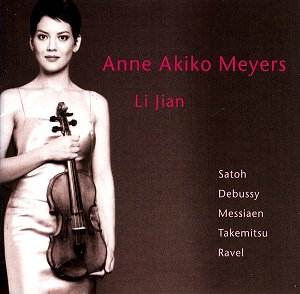This CD takes the Debussy-Ravel
coupling and gives it a little twist.
The two Japanese works are contrastive
and the early Messiaen, which sits at
the heart of the recital, proves, for
me, the highlight of the set. And that
is the problem. I find myself so at
odds with Meyers’ Debussy and to a somewhat
lesser extent her Ravel that I find
it hard to consider the programme in
the light of the damaging aspects that
are so remorselessly a feature of her
performances. Having listened and reviewed
recently a performance of the Debussy
by Alfred Dubois and listening again
to the recording made by his pupil Arthur
Grumiaux I’m afraid my objections are
only reinforced. I note that Meyers
makes a prominent portamento in the
opening phrases of the Debussy, presumably
in emulation of the then performance
style, but why, in that case, does she
treat the succeeding material to the
most grotesque sounding kokyu inflections
– unless she is seeking to assert some
stylistic analogue between this work
and the companion Japanese works. I’m
afraid this is simply not a thought-through
performance – it’s architecturally careless,
directionless, without tension, and
one seemingly incapable of perceiving
the idiom.
If anything, perplexingly,
the Ravel suffers from chronic under-inflexion.
Parts of the performance are attractive
but the underpowered first movement
leads to a lack of phrasal continuity
and inevitability and, indeed, incident.
There’s also a one-dimensionality about
Meyers’ tone that limits engagement.
The Blues second movement is essentially
delicate and the finale more whimsical
than relentless. It’s a point of view,
I suppose, but it sounds superficial
and very dampened down to me.
The Messiaen responds
rather better to Meyers and Jian and
the Takemitsu is a beautifully crafted
and evocative piece. I know Meyers has
promoted Satoh’s Violin Concerto but
the piece recorded here is ten minutes
of inconsequential noodling. In all
this Li Jan seems a pliant and nimble
accomplice. The sound at Tanglewood
opens well and catches sufficient inner
detail. I can only say in conclusion
that I’m astonished that a pupil of
Josef Gingold, himself an Ysaÿe
pupil, should play French works in this
way.
Jonathan Woolf
